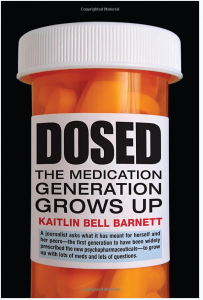People diagnosed with ADHD, depression, or anxiety as children or young teenagers, and treated with medication, may take those medications for a very long time. In the probing and insightful “Dosed: The Medication Generation Grows Up,” the young journalist Kaitlin Bell Barnett explores and assesses the effect of taking psychotropic medications during the crucial developmental years from teenager to young adult in order to understand how and to what extent the use of psychotropic medications shapes young adults.
The cohort born in the 1980s, Barnett herself among them, was the first to grow up taking medications – stimulants, anti-depressives, and anti-anxiety medications. Alternating between the illustrative stories of the young people she has interviewed and her research into the literature studying the long-term effects of psychotropic drugs, and using her own experience as a medicated teenager and young adult to illuminate the issues, Barnett perceptively outlines the questions and conflicts the youth growing up medicated face.
Barnett describes the behavior (inattentiveness, inability to sit still) and the emotions (depression, anxiety), and the paths (school referrals, pediatrician referrals) that may lead young children and teenagers to medication. Despite concerns in the press about overmedication, Barnett makes clear that, while it may not always result in improved school performance, medication has a lot of positives. “Medication at its best enables you to feel that you are playing the role that you were always meant to play,” she says.
But Barnett’s point is a larger one: the task of adolescence is made much more complex for medicated adolescents, as the medicated youngster has to separate the drug from the self and the self from the disorder. Barnett points out that the long-term use of medications poses serious challenges to the sense of self, because the medication itself has shaped who the person is or believes herself to be. Emerging sexuality, the importance of peers, and the presence of alcohol and other drugs, not to mention the challenges of going to college, are other complicating factors. In one particularly poignant vignette, Barnett shows the unhappy results when one of her subjects, who has been depressed most of her life, tries to figure out whether to wind down on anti-depressants during a pregnancy. The drugs may put the fetus at risk, but the possibility of depression puts the mother, and hence the baby, at risk. There is no easy answer.
The most valuable contribution that Barnett adds in “Dosed” is perspective: the perspective of the young people whose lives were altered by medication. Did they grow up differently? They may have. Barnett says that young people who have taken medications may think of their feelings as symptoms, not as a guide to behavior, and may doubt the authenticity of their emotions. And this response, she points out, can lead to other actions: refusal to take medications, either in response to side effects or as a rebellion. These actions in turn may have consequences, not yet fully understood either by science or by the teenagers themselves.
Clearly, some kids need medication; some will need to be on medications for their entire lives. Do your experiences, as student, teacher, parent, treatment provider bear out Barnett’s conclusions? Let us know in the comments.
Have a book you want me to know about? Email me at asbowie@gmail.com. I also blog about metrics here.



